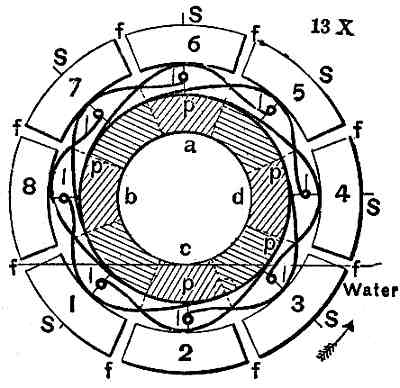23. Perpetual Motion
Differential
water wheel
From this
arrangement it follows that the portion of sponge No.4 which
about to quit the water is pressed upon No. 5 float and spring, which,
from acting vertically, is most efficient in squeezing the sponge dry;
while that portion of the sponge on the point of entering the water is
not compressed at all from its corresponding float No.8, not having yet
reached the edge of the water. By these means, therefore, it will be
seen that the sponge always rises in a dry state from the water on the
ascending side, while it approaches the water on the descending side in
an uncompressed state, and open to the full action of absorption by the
capillary attraction.
(Subsection 935, from
p.374)
From: Gardner D. Hiscox, M.E., Mechanical Appliances and Novelties of Construction (1927), Norman W. Henley Publ. Co.


Nature bears long with those who wrong her. She is patient under abuse. But when abuse has gone too far, when the time of reckoning finally comes, she is equally slow to be appeased and to turn away her wrath. (1882) --
Nathaniel Egleston, who was writing then about deforestation, but speaks equally well about the danger of climate change today.
 Carl Sagan
Carl Sagan: In science it often happens that scientists say, 'You know that's a really good argument; my position is mistaken,' and then they would actually change their minds and you never hear that old view from them again. They really do it. It doesn't happen as often as it should, because scientists are human and change is sometimes painful. But it happens every day. I cannot recall the last time something like that happened in politics or religion. (1987) ...
(more by Sagan) Albert Einstein: I used to wonder how it comes about that the electron is negative. Negative-positive—these are perfectly symmetric in physics. There is no reason whatever to prefer one to the other. Then why is the electron negative? I thought about this for a long time and at last all I could think was “It won the fight!” ...
(more by Einstein) Richard Feynman: It is the facts that matter, not the proofs. Physics can progress without the proofs, but we can't go on without the facts ... if the facts are right, then the proofs are a matter of playing around with the algebra correctly. ...
(more by Feynman)







